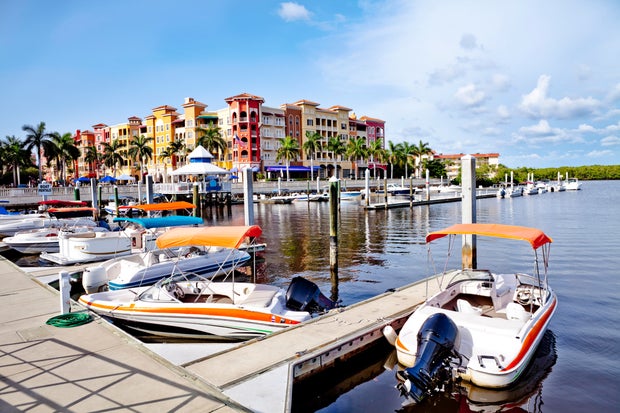CBS News
Best cities to live in the U.S., according U.S. News & World Report

Why was Naples, Florida, just ranked the best place to live in the U.S.? It has much to do with the beachfront city’s job prospects and overall quality of life for residents, according to U.S. News & World Report.
Naples, a resort city, scored especially high for the value residents get for their money and for the ample job opportunities, which were both weighted more heavily in the publication’s ranking this year compared with previous editions.
“This year’s survey found people are concerned about the economy and want more financial stability, so the value and job market categories were the factors that were most important to people. That’s something that really helped Naples,” Erika Giovanetti, U.S. News and World Report’s loans expert, told CBS MoneyWatch.
Naples — with an ultra-low unemployment rate of just 2.9% as of April, well under the overall U.S. rate of 3.9% — also offers relatively high salaries and boasts one of the strongest job markets in the country. Top local industries in terms of job prospects include tourism and health care.
“There is a big retiree population, so there is a lot of well-paid work for health care employees willing to take care of an aging population in that part of the country,” Giovanetti said.
Getty Images
U.S. News’ analysis ranks 150 larger U.S. cities based on criteria including the health of the local job market, affordability of housing, value, quality of life and overall desirability. The rankings are designed to help Americans make informed decisions about where to reside based on their priorities, according to the media outlet.
To assess those priorities, U.S. News asked thousands of Americans what matters most to them when choosing place to live. It created four indexes based on respondents’ answers, weighted as follows: Quality of Life (32%), Value (27%), Job Market (22%), Desirability (19%). The latter category takes into account factors such as weather, number of bars and restaurants per capita, and net migration.
This year’s findings reflected rising consumer concerns about career opportunities and a city’s general affordability. Quality of life remains Americans’ top priority, and was therefore most heavily weighted to determine the rankings.
“While inflation has come down in recent months, Americans are still feeling the impact on their wallets, so finding a place that is affordable and where they feel like they have job stability is increasingly important,” Giovanetti said. “We have also seen cooling off in the labor market over the past several years, and more people feel like they have less power with employers, so they want to live in places where they won’t be unemployed.”
Boise, Idaho landed at No. 2 on this year’s ranking, earning high marks for its value while scoring less well in the desirability category, while Colorado Springs, Colorado, ranked third.
Greenville, South Carolina, ranked No. 4, while Charlotte and Raleigh in North Carolina ranked No. 5 and No. 6, respectively, with the three cities scoring well for their buoyant job market and quality of life.
All cities in U.S. News’ top five “had a good balance of everything” and were especially strong in terms of value, housing affordability and job market, Giovanetti said. “We are really looking for cities that shine in those categories.”
Lee Cohen/Getty Images
Not surprisingly, major cities like New York City and Los Angeles, California, faltered in the value category given their high costs of living. New York ranked No. 124 on U.S. News’ list, while Los Angeles came in at No. 130.
“It can be very difficult for big cities to rank well, and a lot of that has to do with the value index, especially with the outsized impact value has on this year’s rankings,” Giovanetti told CBS MoneyWatch.
“Especially for people looking to buy, it’s not reasonable for them to think of finding a place to buy in New York or L.A., even though the higher salaries help to cut into that. It’s not enough to offset the value,” she added
U.S. News’ top 10 best cities to live in the U.S. are below. Click here for the full list.
- Naples, Florida
- Boise, Idaho
- Colorado Springs, Colorado
- Greenville, South Carolina
- Charlotte, North Carolina
- Raleigh, North Carolina
- Huntsville, Alabama
- Virginia Beach, Virginia
- Austin, Texas
- Boulder, Colorado
CBS News
Should you take out a mortgage loan now or wait until 2025?

Getty Images
For most of 2023 and early 2024, looking for a low mortgage rate was a quest for the impossible. Surging inflation sent rates soaring to their highest level in decades and finding a loan under 7.00% was a fantasy for most would-be buyers.
Fortunately, there has been some improvement in the mortgage market in recent months. In anticipation of the Federal Reserve’s rate cuts in September, mortgage rates dipped, opening up the door to more affordable home loans and even some refinancing opportunities. Rates then fell over a point off their post-pandemic highs, providing hope for would-be buyers.
However, mortgage rates began to rise again in October. While today’s mortgage rates remain below recent highs right now, many borrowers have been left wondering whether they should jump into the market or wait for rates to fall further — especially as the Fed has signaled additional rate cuts are likely through 2025.
Find out how affordable a mortgage loan could be today.
Should you take out a mortgage loan now or wait until 2025?
If you’re on the fence about whether to buy now or delay further, here’s why experts say that waiting may not pay.
There’s no guarantee rates will fall
With the Federal Reserve widely expected to cut rates again in the future, waiting may seem like the obvious course of action. However, there’s no guarantee these anticipated rate cuts will happen — or that they will have the desired effect on the mortgage market since the Fed doesn’t directly control the cost of home loans.
“The challenge with “waiting to buy” is always the same. No one can predict the future, even the greatest financial minds,” says Aaron Gordon, branch manager at Guild Mortgage. “Just look at the last two months. Rates touched an 18-month low in early September. Folks got excited. Pending sales rose to their highest levels all year. Others said ‘they’re still not low enough. I’m going to wait a little longer until they come down more.’ Just weeks later they jumped from the low 6’s to the low 7’s.”
While the Fed followed through with an anticipated rate cut at its November meeting, the recent election could also impact further proposed reductions in the benchmark rate, depending on what policies are enacted in 2025.
With no guarantee that mortgage rates will fall further, Gordon says the best thing to do is to buy “when you’re financially and emotionally ready.”
Compare the top mortgage rates available to you now.
Rate decreases may happen slowly
Delaying your home purchase in anticipation of declining costs could also be a poor strategy because you may have to wait much longer than you’d expect.
“Rates between now and the start of the new year aren’t likely to fluctuate too significantly,” says Evan Luchaco, an Oregon-based home loan specialist for Churchill Mortgage.
Chris Birk, vice president of mortgage insight at Veterans United Home Loans, also doesn’t believe a drop in rates is imminent next year either.
“Buyers waiting for a major drop in mortgage rates should understand that a sudden decline isn’t likely around the corner,” Birk says. “If mortgage rates come down in 2025, it’ll likely be a slow roll.”
Delaying your dream of homeownership for months means missing out on the chance to start building equity — and potentially missing out on a property you love.
“Finding the right home is the most important aspect of the home buying process,” Luchaco says. “A home that achieves your goals for the immediate future will help get you to where you want to be long term.”
Lower mortgage rates could cause a spike in home prices
There’s another important financial reason not to put off your purchase. While a lower mortgage rate could mean reduced borrowing costs, this could be offset by changes in the housing market that a rate drop brings.
“Waiting to buy might not wind up being worth it for a simple reason – rising home prices,” Birk says. “Depending on your price range, your market, and other factors, higher home prices might offset any dip in interest rates. The $400,000 house you love today might cost way more next summer between home price appreciation and the crush of buyers that lower rates might bring.”
Darren Tooley, a senior loan officer at Cornerstone Financial Services, notes that prices could rise rapidly next year.
“Historically, home values have gone up 6.24% in the year following a presidential election, but 2025 could exceed that due to the limited housing supply and an increase in buyer competition,” Tooley says.
According to Tooley, mortgage applications increased by almost 50% when rates hit recent lows at the end of September. While some of this change was explained by a spike in refinancing, most of the new loans were for new purchases.
“It’s clear when rates go down, more potential homebuyers will be flooding the market, which will ultimately continue to drive up home prices, making things more expensive next year despite the lower rate,” Tooley says.
The bottom line
Finally, there’s one last important reason not to delay. Buying a home now allows you to lock in today’s prices while opening up the door for a more affordable loan later.
“Today’s homebuyers will almost certainly be able to refinance down the road,” Birk said. “Buying today, with the flexibility to refinance later, could offer a balanced path forward in an uncertain rate environment.”
CBS News
Jennifer Lawrence and Malala Yousafzai on their new documentary about Afghan women

Watch CBS News
Be the first to know
Get browser notifications for breaking news, live events, and exclusive reporting.
CBS News
Pedro Pascal, Joseph Quinn, and Fred Hechinger on stepping into the world of “Gladiator II”

Watch CBS News
Be the first to know
Get browser notifications for breaking news, live events, and exclusive reporting.




